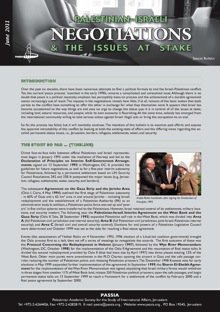Palestinian-Israeli Negotiations & The Issues at Stake
Over the past six decades, there have been numerous attempts to find a political formula to end the Israeli-Palestinian conflict. Yet, the current 'peace process' launched in the early 1990s, remains a complicated and unresolved issue. The impasse in the negotiations reveals how Israel has become accustomed to the way things are and sees no urge to change the status quo: it is in control of all the issues at stake, including land, natural resources, and people, while its own economy is flourishing. The bulletin examines past efforts and exposes the apparent intractability of this conflict by looking at both the existing state of affairs and the differing views regarding the so-called permanent status issues, i.e., Jerusalem, borders, refugees, settlements, water, and security.
Overview
Over the past six decades, there have been numerous attempts to find a political formula to end the Israeli-Palestinian conflict. Yet, the current ‘peace process,’ launched in the early 1990s, remains a complicated and unresolved issue. Although there is no doubt that peace is a political necessity, emphasis has perceptibly been on process and the achievement of a durable agreement seems increasingly out of reach. The impasse in the negotiations reveals how little, if at all, remains of the basic notion that both parties to the conflict have something to offer the other in exchange for what they themselves want. It appears that Israel has become accustomed to the way things are and sees no urge to change the status quo: it is in control of all the issues at stake, including land, natural resources, and people, while its own economy is flourishing. At the same time, nobody has emerged from the international community willing to take serious action against Israeli illegal acts or bring the occupation to an end. So far, the process has failed, but it will inevitably continue. The intention of this bulletin is to examine past efforts and expose the apparent intractability of this conflict by looking at both the existing state of affairs and the differing views regarding the socalled permanent status issues, i.e., Jerusalem, borders, refugees, settlements, water, and security.

